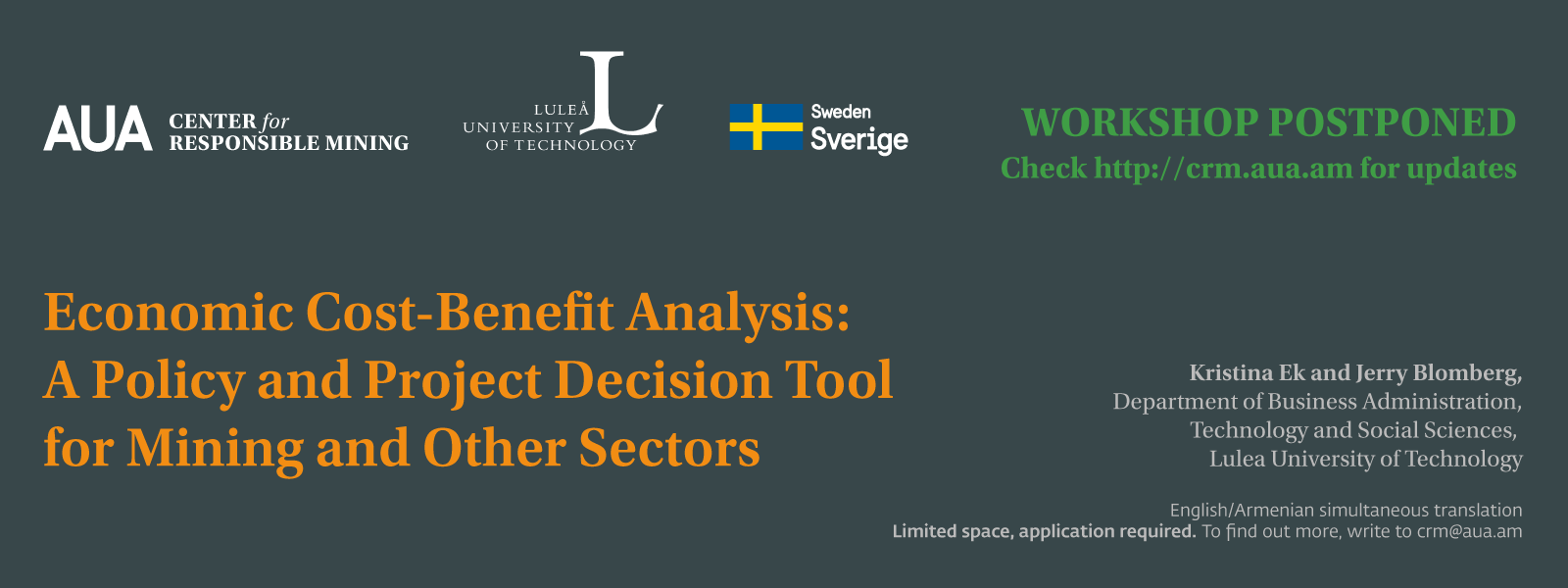About the Workshop | About the Experts | Workshop Time, Location, Requirements | Workshop Agenda
POSTPONEMENT NOTE
Due to the increasing number of international travel restrictions, we are postponing the Professional Workshop on Economic Cost-Benefit Analysis originally scheduled for March 30-April 1, 2020. We will reschedule the workshop as international travel restrictions are updated. We will keep you posted. Thank you for your understanding.
ABOUT THE WORKSHOP
The AUA Center for Responsible Mining and the Luleå University of Technology (Sweden) are offering a 3-day workshop called “Economic Cost-Benefit Analysis: A Policy and Project Decision Tool for Mining and Other Sectors.” The workshop is made possible by support from the Embassy of Sweden Yerevan.
Economic cost-benefit analysis (CBA) is a widely used policy and project decision making tool used in the EU, US, and many developed countries. It involves the use of microeconomics to formally assess the monetized societal costs and benefits, including environmental and human health ones. It allows for assessment of the long-term impact of a policy or project enabling comparison and ranking of policies or projects according to their societal net benefits.
The workshop will help participants:
- Understand the purpose, benefits and limitations of CBA
- Learn about the basic tools, techniques and requirements to conduct a CBA for various projects
- Interpret CBA results to inform the various project design and evaluation process
The workshop draws on a mixture of economic theory, real-life case studies and discussions to examine both the theoretical and practical issues involved in conducting a CBA.
ABOUT THE EXPERTS
Dr. Kristina Ek: Associate professor of economics, Luleå University of technology: Kristina Ek has undertaken extensive research within the field of environmental economics, applying various valuation techniques of non-market goods. She has done research on the requirements when developing wind-power farms. She has also studied flood risk management systems. Ek has extensive educational experience in both undergraduate and graduate levels. Ek has been visiting scholar/guest professor in the US, India, and Mongolia.
Dr. Jerry Blomberg: Senior lecturer of economics, Luleå University of technology: Jerry Bloomberg’s research has mainly been within the field of efficiency analysis, mainly focusing on the mineral and metals industries. Blomberg has also made contributions in the field of recycling of scrap metals and the workings of such markets. Blomberg has extensive experience from teaching on both undergraduate- and graduate levels. Blomberg has been visiting scholar/guest professor in India, Mongolia, the UK, and China.
WORKSHOP TIME, LOCATION, REQUIREMENTS
Dates and time: originally scheduled for March 30-April 1, 2020. Check the website for the new date.
Venue: American University of Armenia
Cost: Free of charge
Application: Complete here. Selection is competitive. Space is limited.
Language: English and Armenian simultaneous translation will be available.
Requirements:
(a) Attendance all 3 days.
(b) Experience and work in related fields.
(c) Participants should identify a policy or project they are involved with to offer for discussion in the workshop. This is intended to deepen the real-life understanding of CBA. Selected participants will be asked to provide their examples before the start of the workshop.
Inquiries: [email protected]
Certification of completion is available.
WORKSHOP AGENDA
| Day 1 | |
| 14:00 – 16:00 | Case 1: Mining: costs and benefits associated with mining What is cost-benefit analysis, why and when is it used? Cost-benefit analysis step-by-step |
| 16:00-16:30 | Coffee Break |
| 16:30-17:15 | Break-out groups – Possible projects/policies to evaluate by cost-benefit analysis (private/public, geographical scope, time) |
| 17:15-18:00 | Introduction to welfare economics |
| Day 2 | |
| 14:00 – 16:00 | Identifying and valuing costs and benefits Decision rules |
| 16:00-16:30 | Coffee Break |
| 16:30-17:15 | Break-out groups – Identify potential costs and benefits with the project/policy (how can these be estimated, e.g. if monetary units are not available) |
| 17:15-18:00 | Case 2: Other applications of CBA: road infrastructure investments, health policy evaluation etc. |
| Day 3 | |
| 14:00 – 16:00 | Discount rates, distributional effects, sensitivity analysis, limitations and criticism |
| 16:00-16:30 | Coffee Break |
| 16:30-17:15 | Break-out groups – Identify possible critical issues in the policy/project |
| 17:15-18:00 | Summary, reflections and wrapping up |

